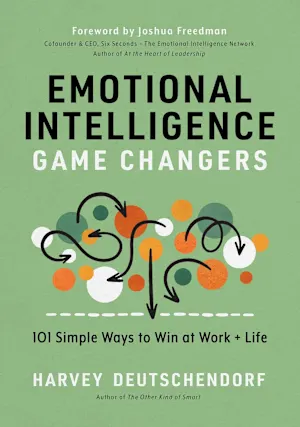
We are living in turbulent times and there is no reason to expect that things will become less so in the future. During such moments our emotions become strained and pushed to their limits. Stress increases as emotions are stretched, making it increasingly important that we are able to recognize the effects of it in ourselves as well as others in our environment.

Becoming acutely aware of ourselves and others we are interacting with in this type of environment is paramount to building healthy relationships in the workplace and all areas of our lives. In my book, Emotional Intelligence Game Changers, I delve into how to navigate difficult times. Here are four ways emotional intelligence can help you navigate turbulent times.
1. Manage triggers
During crisis situations, heightened emotional self-awareness allows us to recognize our triggers. Rather than reacting from our emotions, this allows us to pause, take time out, and respond after we have allowed our emotions to settle down and think things through from a rational perspective. This helps us make reasoned decisions, rather than acting impulsively from our emotions.
2. Sustain relationships
Turbulent times can cause relationships to become strained as everyone feels increased pressure. If this is left unchecked, relationships that would normally stay positive could become fractured. To prevent this, we need to become more empathic and actively listen to others. Emotionally intelligent people have learned to use these tools to help overcome misunderstandings, build support networks, and develop a sense of collaboration and community around them.
3. Build coping strategies
It is hardly surprising that turbulent times cause our stress levels to elevate to new highs. Emotionally intelligent people have developed coping strategies that help them thrive, even during times of unusually high stress. For example, they are aware of and continually practice asking for help, mindfulness, openness, and strategic vulnerability. Modeling these habits helps others they are involved with build their own coping strategies.
4. Deescalate conflict
Conflicts, which are a constant in normal times, will spiral during troubled times, both in intensity and frequency. This requires increased empathy and the ability to listen to and get to know others on a deeper, more personal level. Emotional intelligence allows us to go beyond surface biases and stereotypes as it allows for more curiosity in our interactions with others.
Instead of jumping to judgement and conclusions, it allows us to dig deeper to find out what the other person is going through during this time. Instead of reacting, emotional intelligence allows us to ask relevant questions that will help lower defenses and find out more about what motivates and drives others. Being able to form connections at a deeper level allows us to gain a much better understanding of what motivates and drives them. Even though we may not agree with them, this sets up the basis for a much healthier relationship with them.


